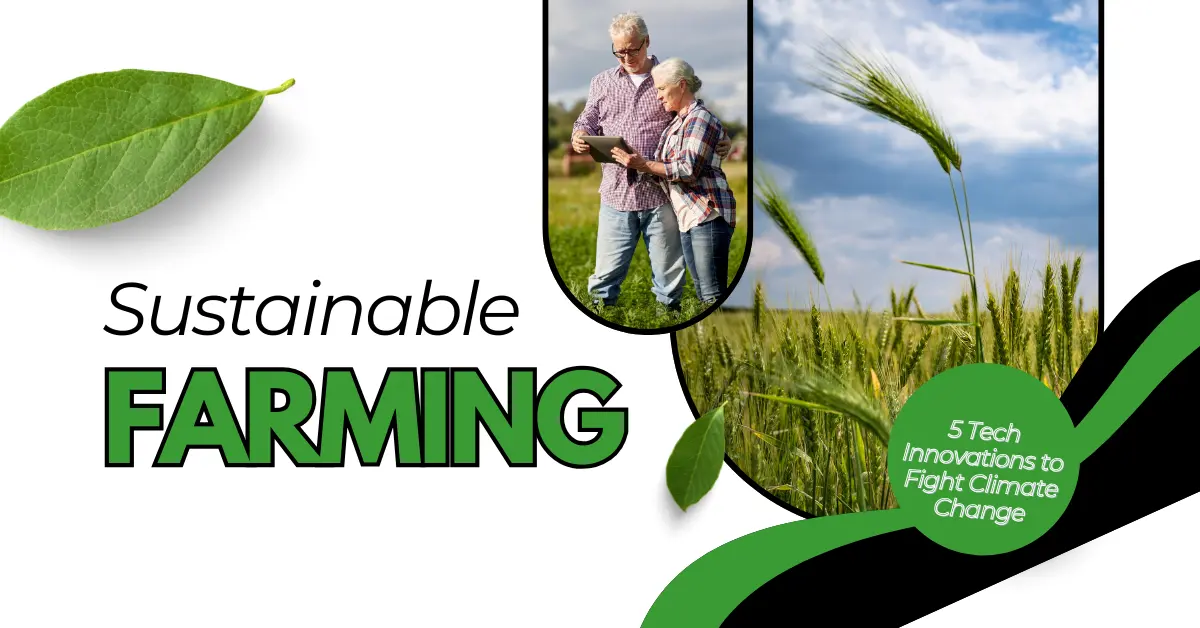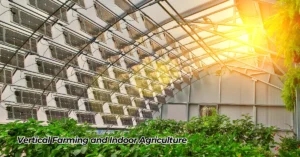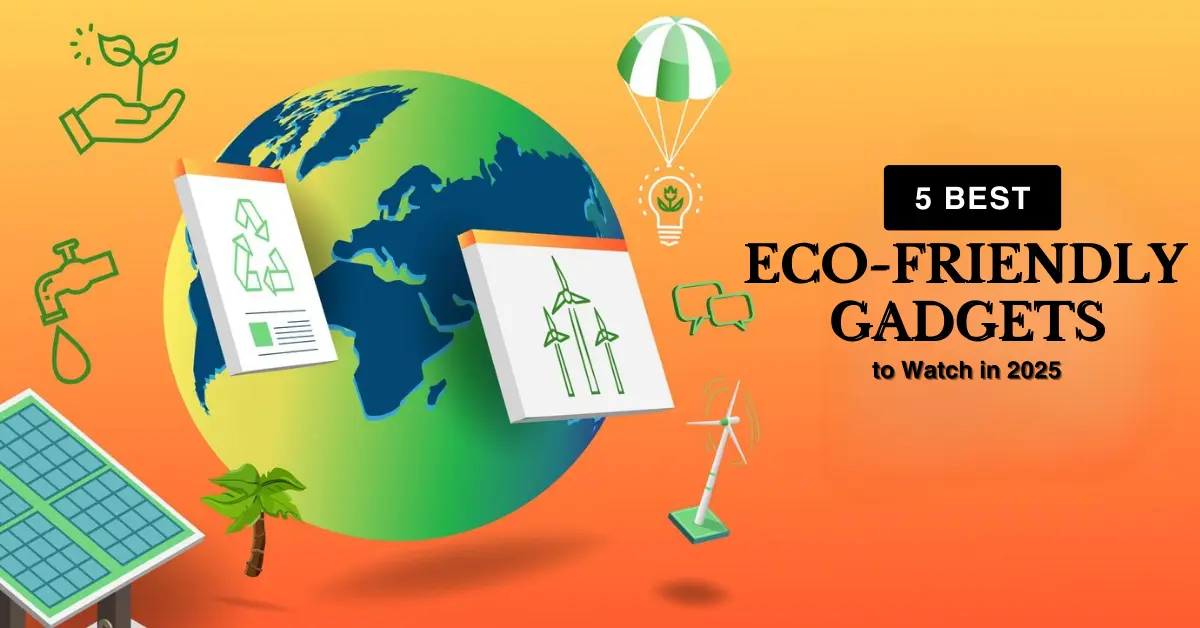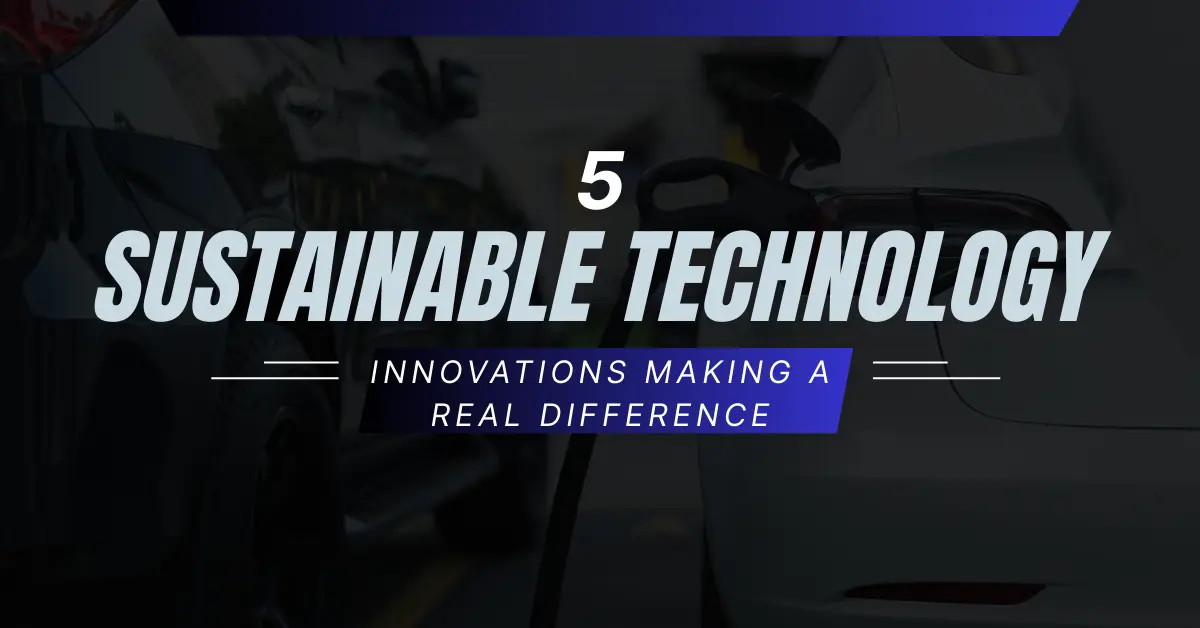
Sustainable Farming: 5 Tech Innovations to Fight Climate Change
- 68
- 0
- 0
Sustainable farming uses eco-friendly practices to grow crops and raise animals without harming the environment. It focuses on preserving soil health, reducing water use, and minimizing chemical impacts. Combining this with advanced technology, like smart irrigation, drones, and renewable energy, helps farmers produce more while protecting nature. These innovations are crucial in tackling climate change by lowering greenhouse gas emissions and conserving resources. By adopting sustainable methods, we ensure healthier food, safeguard ecosystems and build a future where farming supports both people and the planet, even as global temperatures and environmental challenges rise.
Sustainable Farming: 5 Tech Innovations to Fight Climate Change
Agriculture plays a major role in climate change, but new farming technologies are helping to reduce environmental impact while improving food production. Here are 5 breakthrough innovations that are transforming sustainable agriculture and helping farmers fight climate change.
Precision Agriculture Using AI and IoT Sensors

Modern farms are using artificial intelligence (AI) and Internet of Things (IoT) sensors to farm more efficiently. These smart-systems place sensors throughout fields to measure important factors like:
- Soil moisture and nutrients
- Plant health and growth
- Local weather conditions
- Water usage
The sensors send data to AI systems that help farmers make better decisions about exactly when and where to water, fertilize, or treat crops. This targeted approach, called precision agriculture, reduces waste of water and chemicals while maximizing crop yields.
For example, smart irrigation systems only water crops when needed based on real-time soil moisture data. This can crop water use by 30% compared to traditional irrigation. Similarly, precision fertilizer systems apply nutrients only where plants need them, reducing excess fertilizer that can harm the environment.
Vertical Farming and Indoor Agriculture

Vertical farming grows crops in stacked layers inside controlled indoor environments like warehouses. This innovative approach offers several environmental benefits:
- Uses 95% less water than traditional farming
- Requires much less land
- Grows food closer to cities, reducing transportation emissions
- Eliminates the need for pesticides
- Produces food year-round regardless of weather
LED lighting and automated systems control temperature, humidity, and nutrients to create perfect growing conditions. While energy use for lighting and climate control is a challenge, many vertical farms are switching to renewable energy sources.
Plant-Based Meat Alternatives

New food technologies are creating plant-based proteins that look, cook, and taste like meat. These alternatives help fight climate change by:
- Reducing greenhouse gas emissions from livestock
- Decreasing water consumption
- Requiring less land than animal agriculture
- Lowering pollution from animal waste
Companies are using advanced food science to turn plants like peas, soybeans, and mushrooms into convincing meat substitutes. As these products improve and become more affordable, they help reduce the environmental impact of food production while meeting growing protein demands.
Regenerative Agriculture Technology

Regenerative farming focuses on rebuilding soil health to capture more carbon dioxide from the atmosphere. New technologies supporting this approach include:
Carbon Monitoring Systems: Special sensors and satellite imaging track how much carbon soil captures and stores. This helps farmers measure their climate impact and earn carbon credits.
No-Till Seeding Equipment: Advanced planters can seed crops without disturbing soil, keeping carbon locked in the ground while reducing erosion.
Cover Crop Management Tools: Smart systems help farmers plan and manage cover crops that protect soil, add nutrients naturally, and increase carbon storage.
Soil Microbiome Technologies: New products enhance beneficial soil microorganisms that improve plant growth while capturing more carbon.
Sustainable Pest Management Systems

Instead of chemical pesticides, farmers are using technology for more environmentally friendly pest control:
Automated Pest Detection: AI-powered cameras and sensors spot pest problems early, allowing targeted treatment instead of blanket spraying.
Beneficial Insect Habitats: Smart systems help design and maintain areas that attract insects that naturally control pests.
Robotic Weeders: Advanced robots use cameras and AI to identify and remove weeds mechanically, eliminating chemical herbicides.
UV Light Treatment: Controlled UV light exposure helps prevent plant diseases without chemicals.
Real Results for Climate Change
These farming innovations are already showing promising results:
- 20-30% reduction in water use
- Up to 90% less chemical pesticide use
- 30-50% lower greenhouse gas emissions
- Improved soil health and carbon capture
- Higher yields using less land
While implementing new technology can be expensive initially, many farmers find the long-term benefits worth the investment. Government programs and carbon credits are also helping offset costs.
The Future of Sustainable Farming
As climate change continues affecting agriculture, these technologies will become even more important. Ongoing research and development are creating new solutions like:
- More efficient vertical farming systems
- Better plant-based foods
- Advanced soil carbon measurement
- Improved precision farming tools
- New biological pest controls
By combining these innovations, farmers can grow more food while fighting climate change. This helps create a more sustainable food system that can feed a growing world population while protecting our environment.
The shift to sustainable farming technology requires support from consumers, businesses, and governments. But as these tools prove their value, they’re becoming standard practice in modern agriculture. This gives us hope that farming can be part of the solution to climate change while providing food security for future generations.
Remember, every small change in farming methods can have a big impact when adopted widely. Supporting farmers who use these sustainable technologies helps speed up positive change in our food system.
FAQs
What is sustainable farming, and why is it important?
Sustainable farming uses eco-friendly methods to grow crops and raise animals. It’s important because it protects the environment, conserves resources, and ensures healthy food for future generations.
How does technology help in sustainable farming?
Technology supports sustainable farming through smart tools like drones, sensors, and irrigation systems. These innovations improve efficiency, reduce waste, and help farmers adapt to changing weather caused by climate change.
Can sustainable farming reduce greenhouse gas emissions?
Yes, sustainable farming reduces emissions by using renewable energy, minimizing chemical use, and adopting techniques like no-till farming, which traps carbon in the soil instead of releasing it into the air.
What role does renewable energy play in sustainable farming?
Renewable energy, like solar and wind power, helps farms reduce dependence on fossil fuels. It powers equipment, saves costs, and lowers the carbon footprint of farming operations, making them environmentally friendly.
How does sustainable farming protect soil and water resources?
Sustainable farming protects soil through crop rotation and organic fertilizers. It conserves water by using efficient irrigation systems and planting drought-resistant crops, ensuring vital resources are preserved for future use.
Also Read:
Is Plant-Based Protein the Future of Nutrition-The Truth
References:
https://en.wikipedia.org/wiki/Sustainable_agriculture
https://en.wikipedia.org/wiki/Climate-smart_agriculture
Disclaimer:
This blog is for informational purposes only. While we strive for accuracy, we do not guarantee results. Readers should conduct their own research before making decisions. We are not responsible for any actions taken based on this content.
Related post


